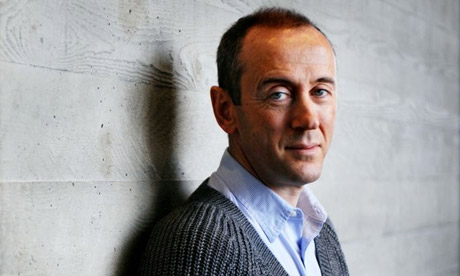
Our voyage around this week's theatrosphere begins close to home. The National Theatre's artistic director Nicholas Hytner has been provoking discussion with his recent article in the Sunday Times, aimed at promoting the National's decision to stage performances on Sunday afternoons.
Mark Shenton picks up on Hytner's comments about our current obsession with diversity in audiences. Hytner argues: "It would be a poor theatre that pleased everyone all of the time and it's time to free ourselves from the obsession with the perfectly formed, beautifully diverse audience. There is no such thing ... Audiences are heat-seeking missiles. They go to what grabs them. It's the variety of what's out there that counts." And Shenton responds, "But venues play their own part in keeping audiences in their comfort zone: the missiles know where to aim towards ... So a theatre like the National throws down the gauntlet when it presents a dance theatre piece like the current in-i, especially when it, too, pushes its creators out of their own territories, in this case with Juliette Binoche having to become a dancer and Akram Khan stretching his acting muscles alongside his dancer/choreographer ones. But if they are working outside of their own boxes, it's interesting to notice that all of the reviews I've seen so far have come from [those] within the dance box: dance critics, not theatre ones, have been sent to review it ..."
However, Chloe Veltman on the Lies Like Truth Blog is more interested in Hytner's statement that "maybe the biggest change in the British theatre since the foundation of the National in 1963 has been, if not the assimilation of the fringe into the mainstream, then at least the blurring of the line between the two". From Veltman's perspective in America, she replies: "If what Hytner says is really true, then the British theatre is indeed enviable for this very reason. Artists working in the theatre on this side of the pond just don't get to move as freely between the fringe and the mainstream. Why? Just as the literary mid-list has dwindled to close to nothing in the book publishing world, so mid-sized theatres are a rarity in this country today. As a result, artists find it hard to transition from making work on a small scale to a larger scale. Plus, there's the need for artists to sustain themselves with better paying jobs in the industry that make the economics of performing on the fringe untenable."
Elsewhere, the Brooklyn-based critic Rob Weiner-Kendt who blogs at The Wicked Stage is discussing the role of the theatre critic. He points to some interesting empirical evidence to suggest that the views of critics are often much closer to that of artists than we may think. He links to a report about a study that the American sociologist Wesley Monroe Shrum did at the Edinburgh Fringe Festival where "he asked 43 directors and actors to say what was good and bad about their own show. The vast majority (84%) used 'phrases or comments' that were similar to those used by one or more of the critics. Some of the artists were much more dismissive of their own work than the critics were. In one play, for instance, the critic praised the acting but the director thought it was 'nervous' and 'patchy'."
On a different topic entirely, the Chicago theatre blogger Don Hall is describing some of the techniques he uses with actors. One of his strategies is to get them to improvise scenes in public places in front of members of the public who, unwittingly, then become the audience: "'Improv in the Real World' is a directing affectation that I force casts to endure to inject a sense of what performing without an audience and outside of the tiny cell that is the stage feels like. The idea is that the actors will gain a sense of immediacy and genuine humanity and inject it into their performance later."
In one respect it sounds similar to the Invisible Theatre work that the Brazilian director Augusto Boal has been doing for many years - though with fewer explicitly political intentions.
And finally, for all those who were having withdrawal symptoms, it is a relief to see that the West End Whingers are back from their holiday in Namibia where "despite being deprived of theatrical experiences they've had plenty to whinge about nonetheless". Do get over to their blog and read all about their travails with scorpions and quad bikes, as well as their thoughts on the latest London theatre offerings.







